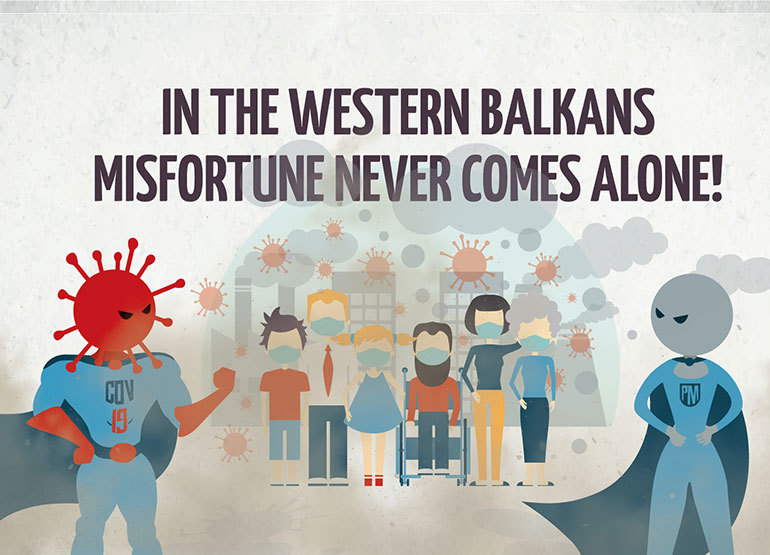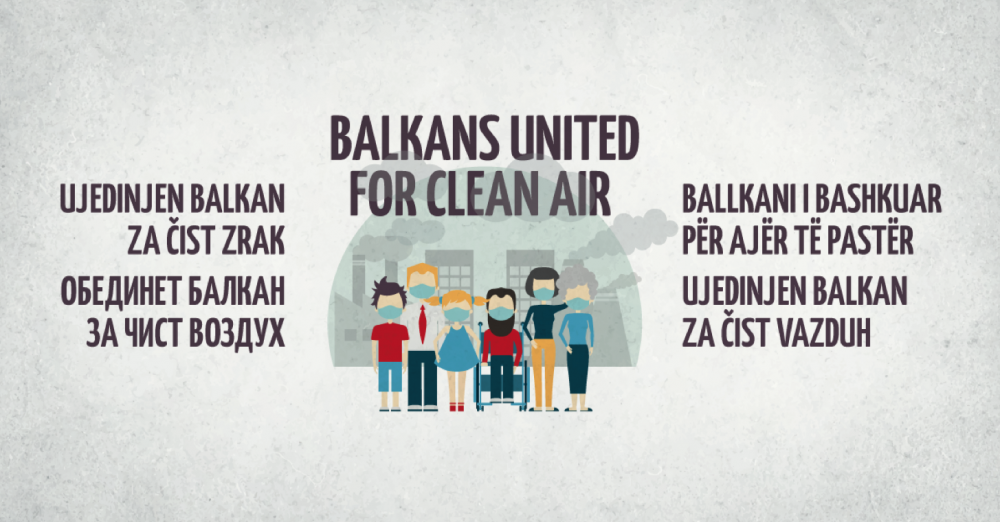
Very poor air quality is one of the biggest problems faced by the countries in the Western Balkans. Air pollution and the COVID-19 pandemic have contributed to an increase in mortality in this region. As a response to this dire circumstances, our regional campaign "Balkans United for Clean Air" calls upon the competent institutions in Western Balkan countries and their citizens to take joint action that will help improve the air quality and reduce COVID-19-related mortality rates. The campaign emphasizes the regional cooperation as a necessity for the transformation of the energy sector and the environment protection system, which would improve both the economy and public health.
Particulate matter (PM) and SARS-CoV-2 exert a negative influence on the same cells and cell components, which is why infected persons exposed to air pollution are affected by additional respiratory deterioration in response to the presence of SARS-CoV-2. This causes more severe forms of COVID-19, as well as higher mortality rates. Long-term exposure to harmful emissions increases the risk of contracting acute and chronic diseases, mostly those affecting the respiratory system. Due to its reduced functioning, it becomes more prone to virus infections, including the one caused by the coronavirus (SARS-CoV-2).
The number of evidence and scientific studies on the correlation between air pollution and COVID-19 is growing, but there are still subject to certain limitations that should be considered, particularly the fact that no relevant study has been carried out with regard to the Western Balkans region. We need environmental and epidemiological studies on the links between air pollution and COVID-19 in the Western Balkans region. They need to be planned and implemented with precision, to enable adequate conclusions and recommendations of measures to be taken. Hitherto research indicates that air pollution does cause excess COVID-19 mortality – globally by 15%, and by 19% in Europe. In addition, it was determined that a 1 microgram per cubic meter increase in particulate matter concentration also increases COVID-19 mortality by 11%. The fragility of healthcare systems in Western Balkan countries is additionally laid bare when the air pollution problem is cross-referenced with the COVID-19 pandemic.
In hospitals across the region, the availability of ventilators and hospital beds is inadequate, and we have for years faced the issues of healthcare workers’ migration and deficient number of staff working in intensive care units.
With the "Balkans United for Clean Air" campaign, we demand that decision-makers increase the level of participation of healthcare sector representatives in decision-making processes, to ensure timely integration of healthcare measures in policies focusing on environmental protection. In addition, it is necessary to improve the efficiency of law implementation and decision-making in the field of environmental protection, to gain greater health and economic benefits for all citizens.
We believe that it is necessary to integrate measures for improving air quality in public policies and COVID-19 relief plans, in accordance with the commitments contained in the Green Agenda for Western Balkans, which was adopted by all the states,
Having the regional perspective of this common burning issue, the “Balkans United for Clean Air” campaign initiated by the European Fund for the Balkans is spread across the region in partnership with the Right to the City from Belgrade (Serbia), Environmental and Territorial Management Institute from Tirana (Albania), Ekoforum from Zenica and for Ecology and Energy from Tuzla (Bosnia and Herzegovina), Sbunker from Pristina (Kosovo), Air Care from Skopje (North Macedonia) and OZON from Podgorica (Montenegro).
You can become part of the “Balkans United for Clean Air” campaign, because only by joining forces we can improve air quality in the Western Balkans, and polluted air knows no borders, religion, nation, sex, or age. If you want to join us, fill out your contact details via one of the following links:
Serbia: http://bit.ly/UjedinjeniBalkan
Bosnia and Herzegovina: http://bit.ly/UjedinjenBalkan
Montenegro: http://bit.ly/UjedinjenBalkanZaCistVazduh
North Macedonia: http://bit.ly/ObedinetBalkan
Albania: http://bit.ly/BallkaniiBashkuarALB
Kosovo: http://bit.ly/BallkaniiBashkuarKS
ENG: http://bit.ly/BalkansUnited
Continue reading…

MISFORTUNE NEVER COMES ALONE: AIR POLLUTION AND COVID-19
For years, Western Balkans has been one of the regions in Europe most affected by air pollution. Cities in this region frequently top the lists of world’s most polluted cities. When one adds to this the global COVID-19 pandemic which to a great extent marked 2020 and is still ongoing, this results in an additional increase in respiratory disease and higher mortality rates.
Misfortune never comes alone – this is a well-known saying in Western Balkans. It was practically reinforced by the year 2020 when the impoverished, air pollution-affected societies were additionally hit by the COVID-19 pandemic.
The main cause of air pollution in the Western Balkans is particulate matter (PM), which has a negative influence on the same cells and cell components in the human organism as the coronavirus does. For that reason, persons who are exposed to air pollution on a daily basis have weaker immune systems, hence the organism’s response to the presence of coronavirus is more volatile, which contributes to the development of more severe forms of COVID-19, including more frequent deaths.
Long-term exposure to harmful airborne substances increases the risk of acute and chronic diseases, mostly those affecting the respiratory system. As a result of its impaired function, it becomes more prone to the influence of virus infections, including the one caused by the coronavirus (SARS-CoV-2).
Air Pollution and COVID-19: What are the causal links?
At the very beginning of the pandemic, research and studies have emerged which link the increased number of COVID-19 infections and deaths in regions with polluted air.
Before we present individual research results, it should be noted that a positive correlation between air pollution and the number of COVID-19-infected persons is a priori expected, given that air pollution correlates with high population density, hence with a high number of deaths. A clear conclusion on whether air pollution contributes to the risk of death from COVID-19 requires long-term epidemiological studies and the consideration of numerous factors. Such scientific papers are still being drafted and we cannot state with absolute certainty whether there is a causal link between air pollution and COVID-19.
Research from China, England, USA, Germany, the Netherlands, and Italy have shown that increased air pollution can cause the increase of the number of infections, as well as higher COVID-19 mortality rates . Research in Germany shows that a PM10 increase also raises mortality in COVID-19 patients aged over 80, by 30% in men, and 35% in women .
When comparing this data, one can conclude that air pollution increases COVID-19 mortality rates, by 15% globally, and by 19% in Europe . As previously stated, the main cause of air pollution is particulate matter, and an increase in its concentration by 1 microgram per cubic meter increases COVID-19 mortality by 11% .
Unfortunately, when it comes to the Western Balkans region there still lack relevant studies and research, which prevents us from offering concrete data. It is very likely that this data would not differ with regard to this region, one even assumes that it would be worse. Even without the influence of COVID-19, air pollution in the region causes up to 13,500 premature deaths every year; so far, 693,902 people have contracted COVID-19, and 13,423 have died as a result of it.
How to improve the epidemiological situation and achieve cleaner air in the Western Balkans?
The number of evidence and scientific studies on the link between air pollution and COVID-19 is growing on a daily basis. However, as we have stated, one should take into account these studies’ limitations. In order to react properly, it is necessary to make decisions based on valid information. Therefore, the drafting of at least one, or even multiple studies, is necessary, analyzing the correlation between air pollution and COVID-19 in the Western Balkans region. Such analyses must be planned and carried out precisely, so that they can produce adequate conclusions and recommendations of measures to be taken.
When recommending measures, one must also take into account the state of Western Balkan countries’ healthcare systems. The course of the pandemic has laid bare the consequences of lacking hospital beds, a trend of doctors’ and medical staff migration, insufficient ventilators and other equipment, as well as a general lack of investments. At a time when they are affected by the COVID-19 pandemic, the pressure on these fragile healthcare systems often exceeds maximum levels. Hence, it is necessary to increase participation by healthcare sector representatives in decision-making processes, so as to ensure a timely integration of healthcare measures in policies directed at environmental protection.
Western Balkan governments must react and improve efficiency in the implementation of laws and decisions in the field of environmental protection in order to gain greater healthcare-related and economic benefits for all citizens. Alone the coal-fired thermal power plants in the Western Balkans cause economic damages in form of healthcare costs estimated at €1.9-3.6 billion, paid by the region’s citizens every year.
Finally, it should be emphasized that COVID-19 will eventually be a thing of the past, but that air pollution must not remain the old "normal". A timely reaction implies that measures to improve air quality are introduced in public policies and COVID-19 relief plans in accordance with the commitments contained in the Green Agenda for the Western Balkans which was accepted by all of the states.
Indeed, in the Western Balkans misfortune never comes alone – we must therefore wage a solidary battle on multiple fronts to defeat this calamity. For that reason, it is important to develop regional multisectoral policies that include the improvement of the environment and of public health, given that this type of problem calls for a joint, regional solution.






